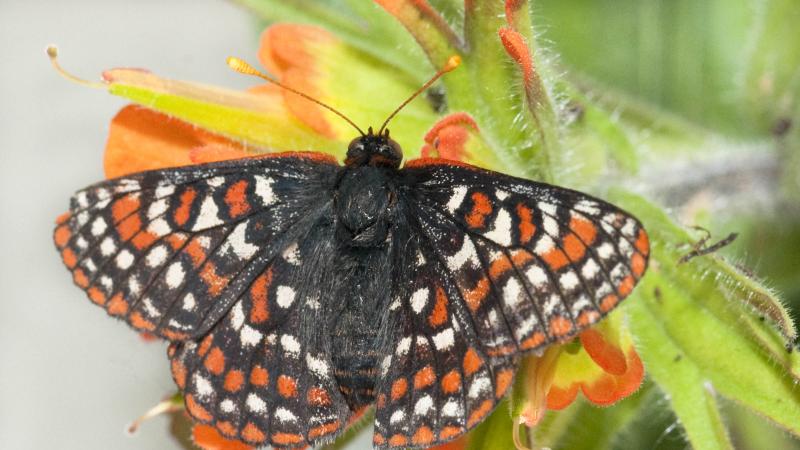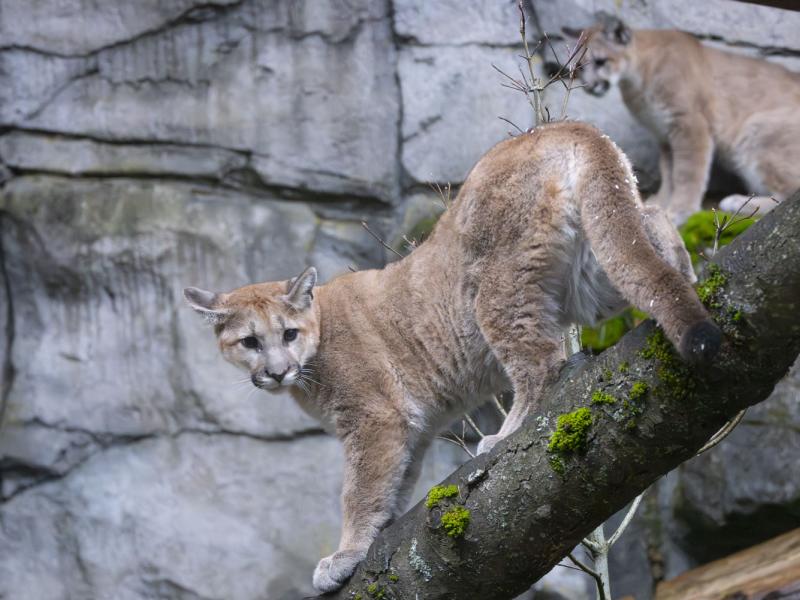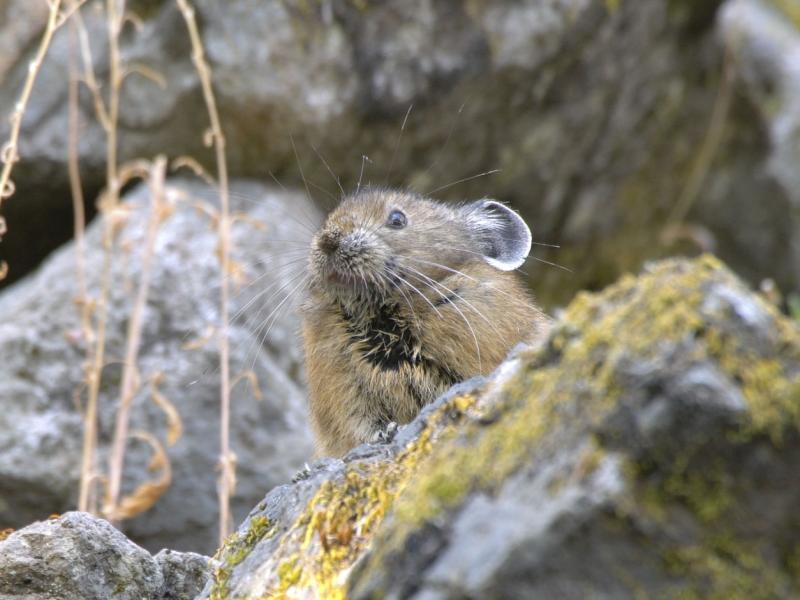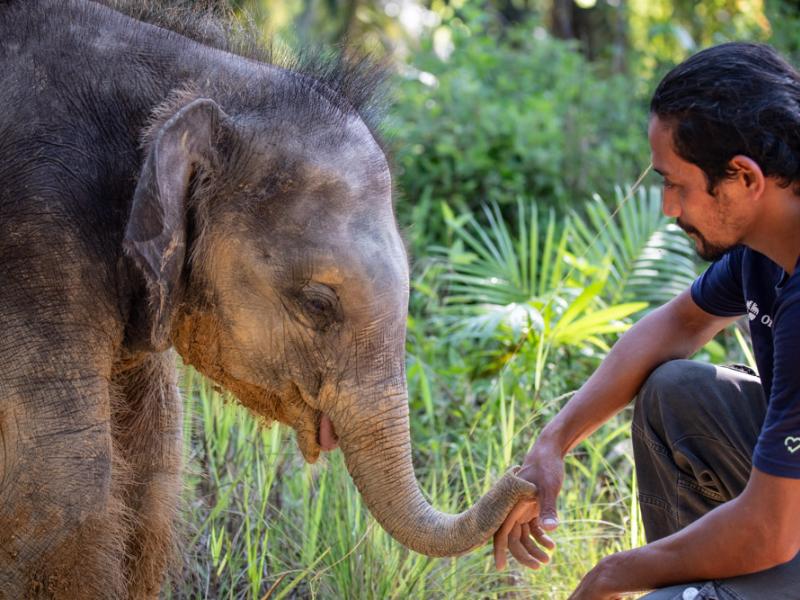With inmates' help, rare Northwest butterfly is homeward bound

Innovative program helps return endangered butterfly to the wild in Oregon
For nearly 750 endangered butterflies raised at the Coffee Creek Correctional Facility, it's time to head home.
For much of the past year, inmates at Coffee Creek have raised and cared for Taylor's checkerspot butterfly larvae as part of a collaboration with the Oregon Zoo, U.S. Fish and Wildlife Service and the Institute for Applied Ecology.
Last week, they transferred 476 of the growing caterpillars back to conservation biologists at USFWS for release on western Oregon prairies near Corvallis, and another 246 are scheduled for release this week. It is the second-ever release of Taylor's checkerspots in Oregon — the first being last year's inaugural release of 562 Coffee-Creek-reared caterpillars — where only two known populations of this rare Northwest butterfly remain.
"Having a captive rearing and release program in Oregon is vital for the recovery of Taylor's checkerspots," said Oregon Zoo butterfly conservationist Ronda Naseth, who advises the program at Coffee Creek. "Bringing butterfly conservation work into a medium-security housing unit continues to be a rewarding process."
Coffee Creek's butterfly conservation lab launched in May 2017, with funding from USFWS and the help of an Oregon Zoo Foundation grant. Zoo staff taught inmates how to care for butterfly eggs and raise larvae, supporting their efforts along the way. In 2018, inmates also learned how to care for the adult female butterflies that lay the thousands of eggs needed for the program's success.
"Inmates who have the opportunity to participate in this species recovery program are eager to share what they've learned with their loved ones," said Naseth. "That has the wonderful ripple effect of more and more people in our communities caring about the future of these butterflies."
Rearing the rare butterflies comes with many challenges. One of the most difficult tasks is feeding the ever-munching larvae, which require vast quantities of specific plants. The Institute for Applied Ecology assists the lab in supplying, propagating and harvesting plantago plants for this purpose. The level of care is crucial: The species is listed under the U.S. Endangered Species Act and, according to Xerces Society for Invertebrate Conservation, is in imminent danger of extinction.
In addition to the inmates that rear the Taylor's checkerspots, another team of inmates is dedicated to the care and harvest of the 2,200 plantago plants that feed the larvae. Two of these plantago crew members have been cross-training in the butterfly lab since February, sharing the knowledge they are gaining about the larvae's nutritional needs with their fellow crew members.
"We have all learned so much since our first season, " Naseth said. "The butterfly team is thrilled to have partners who are working so diligently at providing the lab with beautiful harvests, and we are exceptionally proud of the quality of larvae being released this year. "
The Coffee Creek-reared caterpillars will complete their development in the wild, first turning into chrysalides and then — over a span of warm, sunny days this spring — emerging as adult butterflies and unfurling for the first time their distinctive, colorful wings.
Though once abundant across the inland prairies of the Pacific Northwest, the Taylor's checkerspot has now lost 99 percent of its grassland habitat to successional plant growth, agriculture and urban development. And while the butterflies themselves are small, the restoration of their high-quality native prairie habitat also benefits a multitude of other species associated with this ecosystem.
The Oregon Zoo has provided more than 28,000 checkerspots for release since joining the recovery effort in 2004 — including a record-setting 5,398 larvae transferred to the Washington Department of Fish and Wildlife last month for release in the south Puget Sound area, where some of the region's best prairie habitat remains.
Committed to butterfly conservation, the Oregon Zoo is a charter member of the Association of Zoos and Aquariums' Butterfly Conservation Initiative, a collaborative effort among nearly 50 zoos and aquariums. To rear checkerspots and release them into the wild, the zoo works in partnership with and receives funding from the Washington Department of Fish and Wildlife and Joint Base Lewis-McChord. Additional project partners include the U.S. Fish and Wildlife Service, the Sustainability in Prisons Project which is a partnership founded by The Evergreen State College and Washington State Department of Corrections, Mission Creek Corrections Center for Women, Larch Corrections Center, the Institute for Applied Ecology, Coffee Creek Correctional Facility and the Xerces Society.
More News

Rescued cougar cubs are venturing out
A pair of orphaned cougar cubs, rescued and brought to the zoo by Washington Department of Fish and Wildlife staff in November, have begun exploring their outdoor habitat.April 17, 2025

Zoo seeks pika watchers for summer season
The Oregon Zoo is recruiting volunteers for Cascades Pika Watch.April 15, 2025

Zoo convenes action for imperiled elephants
Sabah government representatives joined conservation NGOs, local communities, palm oil producers, and tourism operators this week in the fight to save the world’s smallest elephants from extinction.April 11, 2025

